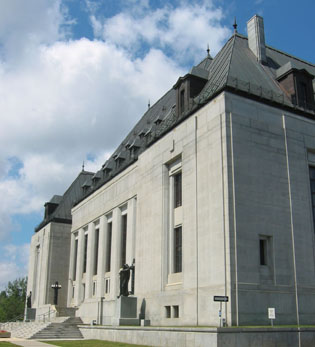 Two cases involving high-profile Quebec lawyers who were disciplined for misconduct made their way to the Supreme Court of Canada.
Two cases involving high-profile Quebec lawyers who were disciplined for misconduct made their way to the Supreme Court of Canada. In Barreau du Québec v. Micheline Parizeau, the celebrity divorce lawyer was charged with various professional misconduct offences, including using false evidence, destroying evidence, and inciting a client to commit perjury. In 2000, she was disbarred for seven years, which she was able to get reduced to five years.
In 2005, she applied for re-entry to the legal profession but was denied by the Barreau du Québec’s executive committee. When the Professions Tribunal reversed that decision, the barreau took the case to the Quebec Superior Court. The case made it all the way to Canada’s top court, which dismissed the barreau’s application for leave to appeal on March 15. Parizeau is now free to practise law without having to advise clients of the legal proceedings against her.
The barreau refused to comment on the ruling “to respect the authority and independence of the courts,” said Martine Meilleur, communications co-ordinator at the Barreau du Québec, in an e-mail to Legal Feeds.
“The Supreme Court’s decision ends the possible recourses in justice by the Barreau in this matter,” added Meilleur. “However, this recent decision of the Supreme Court of Canada doesn't affect the status of Me Parizeau since she has had her réinscription to the roll of advocates in November 2009 when the Tribunal des professions overruled the decision of the Comité des requêtes. Me Parizeau has [had] regular member status since November 2009.”
Gilles Doré is another Quebec lawyer who faced disciplinary action from the Barreau du Québec. While arguing his client’s case before the Quebec Superior Court in 2001, the judge criticized Doré. In response, Doré “wrote a private letter to the judge calling him loathsome, arrogant and fundamentally unjust, and accusing him of hiding behind his status like a coward, of having a chronic inability to master any social skills, of being pedantic, aggressive and petty, and of having a propensity to use his court to launch ugly, vulgar and mean personal attacks,” according to the SCC’s March 22 ruling in the case.
Following Doré’s letter, the barreau suspended him for 21 days for violating the Code of ethics of advocates, which he claimed infringed his freedom of expression. Quebec’s Superior Court and Court of Appeal upheld the suspension. The Supreme Court then unanimously dismissed his appeal.
In addressing Doré’s constitutional challenge of the decision to suspend him, Justice Rosalie Abella referred to another case: “As this Court has noted, most recently in Catalyst Paper Corp. v. North Cowichan (District) . . . the nature of the reasonableness analysis is always contingent on its context. In the Charter context, the reasonableness analysis is one that centres on proportionality, that is, on ensuring that the decision interferes with the relevant Charter guarantee no more than is necessary given the statutory objectives. If the decision is disproportionately impairing of the guarantee, it is unreasonable. If, on the other hand, it reflects a proper balance of the mandate with Charter protection, it is a reasonable one.
“In this case, the discipline committee’s decision to reprimand the lawyer reflected a proportionate balancing of its public mandate to ensure that lawyers behave with ‘objectivity, moderation and dignity’ with the lawyer’s expressive rights. It is, as a result, a reasonable one.”
Abella noted the pressure that lawyers are under, however, she wrote “lawyers should not be expected to behave like verbal eunuchs. They not only have a right to speak their minds freely, they arguably have a duty to do so. But they are constrained by their profession to do so with dignified restraint.”
As a well-known criminal defence lawyer, Doré is no stranger to controversy. Last November, he was badly beaten during his involvement with a Hells Angels mega-trial in Montreal.







